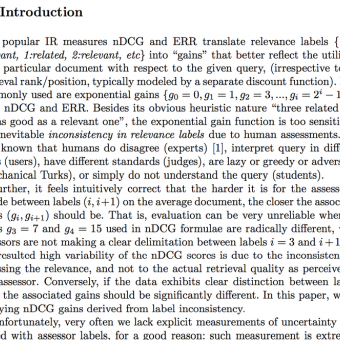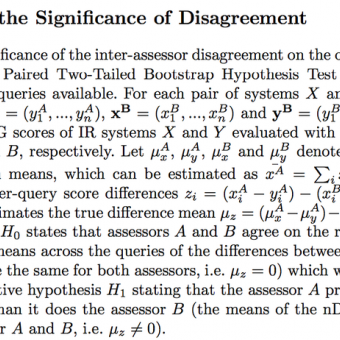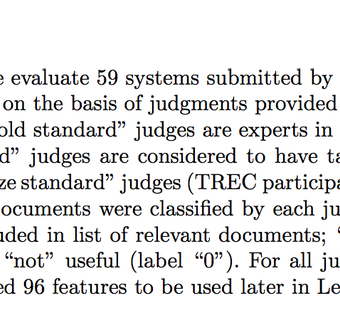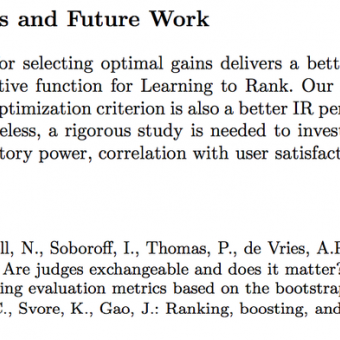RuSSIR 2013: VII Summer School on Information Retrieval
On September 16–20, 2013, Kazan will host the VII Russian Summer School on Information Retrieval ( RuSSIR 2013 ).
It is organized by Kazan Federal University ( KFU ) and the Russian Seminar on the Assessment of Information Search Methods ( ROMIP ) with the participation of Yandex, Mail.ru, Google and ABBYY.
The main theme of the school this year will be the search and processing of audio information. The working language is English. The main program consists of 7 courses: Voice and Music Information Retrieval:

General Information retrieval:
Participation in the school is free, but the number of places is limited.
The work should correspond to the subject of the school, and may relate to one of the following areas (but not necessarily precisely to them):
The school will host the RuSSIR YSC 2013 conference, where you can present your work.
A full publication (full paper) is issued as a full-fledged scientific article in English , in accordance with the template ( Springer template ). The article should be presented original unpublished work.
The maximum number of pages is 10. At least one of the authors must be under 30 years old.
Accepted articles will be published in a special issue of the scientific journal "Scientific notes of Kazan University" (included in the list of the Higher Attestation Commission, if that).
Acceptance of an article guarantees your admission to school. But even if the article is not accepted, it still seriously increases the chances of your application.
The publication must be sent in PDF format byJune 2, June 14, 2013 through the systemEasyChair .
Are you an ordinary developer and the thought of writing a scientific article is terrifying to you? Your work is not ready yet? Or, on the contrary, are the results of the work already published elsewhere?
Then all you need to participate is to prepare a short message, or, in the language of the scientific community, a poster paper. A poster article is a 2-page English text describing your current project, or an interesting idea for future work, as well as, possibly, a previously published work.
Make a poster article is not at all difficult. Let's take it in order. As an example, take the best poster paper of the recent international ECIR conference in Moscow:
The poster article should be sent as a PDF document through the participant form.
To fill out the registration form, you will need to prepare several additional materials:
Next, go to the page of the participant form , fill it in and submit.
Please note that the deadline for submitting the form isJune 14, June 25, 2013 .
If something is not clear, I will try to answer in the comments.
It is organized by Kazan Federal University ( KFU ) and the Russian Seminar on the Assessment of Information Search Methods ( ROMIP ) with the participation of Yandex, Mail.ru, Google and ABBYY.
The main theme of the school this year will be the search and processing of audio information. The working language is English. The main program consists of 7 courses: Voice and Music Information Retrieval:

- Spoken Content Retrieval: Challenges, Techniques and Applications - Gareth Jones (Dublin City University)
- Content- and Context-based Music Similarity and Retrieval - Markus Schedl & Peter Knees (University of Linz)
- Query by Singing / Humming and Audio Fingerprinting as Two Successful Paradigms of Music Information Retrieval - Jyh-Shing Roger Jang (Taiwan University)
- Adaptivity in Audio and Music Retrieval - Andreas Nürnberger & Sebastian Stober (OVG University Magdeburg)
General Information retrieval:
- Introduction to Information Retrieval Models - Massimo Melucci (University of Padua)
- Techniques for Large Scale Information Retrieval - Paolo Boldi (University of Milan)
- Novel representations and methods in text classification - Manuel Montes-y-Gómez & Hugo Jair Escalante (INAOE, Mexico)
Participation in the school is free, but the number of places is limited.
How to get?
To take part in the school, you must fill out an application and send a scientific article or poster report describing your work - development or scientific research.The work should correspond to the subject of the school, and may relate to one of the following areas (but not necessarily precisely to them):
- Music Information Retrieval (MIR);
- IR and theory and models;
- Data structures, algorithms, and indexing;
- Natural language processing;
- User interfaces;
- Semantic Web and knowledge databases;
- Text mining, information and fact extraction;
- Mobile applications for IR and Databases;
- Dynamic media and data streams;
- Social search, recommendations and personalization;
- IR evaluation.
The school will host the RuSSIR YSC 2013 conference, where you can present your work.
The hardcore way: full publication
A full publication (full paper) is issued as a full-fledged scientific article in English , in accordance with the template ( Springer template ). The article should be presented original unpublished work.
The maximum number of pages is 10. At least one of the authors must be under 30 years old.
Accepted articles will be published in a special issue of the scientific journal "Scientific notes of Kazan University" (included in the list of the Higher Attestation Commission, if that).
Acceptance of an article guarantees your admission to school. But even if the article is not accepted, it still seriously increases the chances of your application.
The publication must be sent in PDF format by
The light way: article poster
Are you an ordinary developer and the thought of writing a scientific article is terrifying to you? Your work is not ready yet? Or, on the contrary, are the results of the work already published elsewhere?
Then all you need to participate is to prepare a short message, or, in the language of the scientific community, a poster paper. A poster article is a 2-page English text describing your current project, or an interesting idea for future work, as well as, possibly, a previously published work.
Make a poster article is not at all difficult. Let's take it in order. As an example, take the best poster paper of the recent international ECIR conference in Moscow:
- Use the ready-made Springer template. Any article should contain: title, authors data and a brief abstract (abstract). An annotation usually very briefly formulates the general context of your research and provides the most important facts or results of your research.

- As a rule, the first chapter of an article, or Introduction, reveals the context of the study in more detail, as well as formulates the main problems and tasks that are solved during the study.

- Next, you reveal your approach proposed for solving the problem.

- If available, provide experimental results.

- And in the end, draw conclusions about the study and provide a short list of used literature.

The poster article should be sent as a PDF document through the participant form.
Submit Member Form
To fill out the registration form, you will need to prepare several additional materials:
- poster article (see above): if you are the author of the full article, it is enough to send a brief annotation of it;
- CV (CV), which is filled in a free form in English with a mandatory indication of your level of education, professional experience, a list of scientific publications and other achievements;
- (optional) letter of recommendation - this may be a letter from your academic advisor or teacher with the obligatory indication of his contact information (electric mail, phone).
Next, go to the page of the participant form , fill it in and submit.
Please note that the deadline for submitting the form is
If something is not clear, I will try to answer in the comments.
